Welcome to Germany! This guide will provide you with information about the country you now find yourself in. It has been designed in response to common questions asked by refugees. Much of the advice in this booklet should not be seen as a law or a strict rule. People in Germany will not always act according to this guide. However, most of the behavior described here is common practice for most of the people, most of the time. More information.
englisch / english
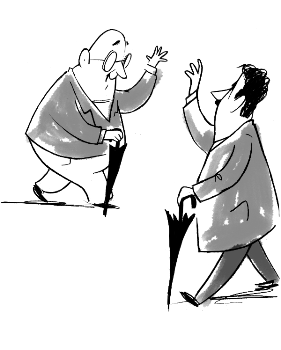
Chapter 1 – Public Life
-
“Guten Tag” (Good day) and “Auf Wiedersehen” (Good bye) are common greetings. Saying “Guten Tag” is common when you meet a person or a small group of people. For example in small shops or the doctors’ waiting room say “Guten Tag” to greet the people who are already there. You can greet people on the street in small villages in the same way.
-
Smiling in public is fine and quite acceptable, it is not considered to be flirting, even if you are talking to a stranger. People are just being friendly and welcoming when they smile.
-
People in Germany value their personal space and privacy, so they can sometimes appear distant. For example, it is quite normal to sit next to a stranger on a train for hours and only say hello and goodbye. Most people prefer to sit on their own on public transport.
-
For privacy and quiet, people usually close their doors, e.g. in offices and at home. You should knock on the door before you go in. Usually you will then be made welcome and asked to come inside.
-
Sunday is a quiet day. Almost all shops are closed and few people go to work. Neighbors might complain if you make a noise and disturb them on a Sunday, e.g. if you mow the lawn or put new shelves on the wall. People in Germany also expect there to be no noise at night while they sleep. ‘Sleep time’ is between 10 pm (22.00) and 6 am (06.00).
-
Urinating in public can be an offense. Public toilets (WCs) are available in most places. WCs usually have toilet paper, but not a bidet. It is perfectly OK to throw toilet paper into the toilet. Don’t throw it into the waste bin. However, you should throw sanitary pads or tampons into the bin not into the toilet. There’s usually a toilet brush next to the toilet: use the brush to clean off any marks you’ve made. Make sure you leave the toilet clean and dry. Therefore, it is advisable to use the toilet in a sitting position. Where no urinal is available, this applies for men, too. For reasons of hygiene it is expected that you wash your hands before you leave the toilet.
-
In public, particularly on public transportation, it is considered rude to have long, loud conversations. Conversations and phone calls are rather made in a quiet voice.
-
On public transport special seats are reserved for the elderly, sick, and pregnant women – and there are spaces for buggies and wheelchairs. People usually try to leave these places free or move aside if they are needed.
-
On escalators, people usually stand on the right and walk on the left.
-
If you need help, you can ask any adult person: Most people are usually friendly. You shouldn’t approach children without permission from their parents.

Chapter 2 – Personal Freedom
-
Everybody is allowed to practice whatever religion they want – or no religion at all. Religion is considered a private matter. So you are free to believe whatever you like, but you are also expected to accept that other people may believe in another God or nothing at all.
-
Discussions and debates in Germany usually try to find a compromise or come to an agreement. The press has a special kind of freedom, known as ‘the freedom of the press’. This is guaranteed by law. The press reports on a wide range of topics, and is allowed to criticise the government and other institutions (such as churches).
-
“Freedom of speech” allows you to express your opinion – as long as you don’t discriminate, or seriously insult or threaten anyone.
-
It is common for couples of the same or different sex to show affection in public. This includes holding hands and sometimes kissing or cuddling in public. This is accepted and acceptable behavior. This should just be ignored.
-
Having bare arms or legs is common and normal, for example when wearing a t-shirt or shorts or a short skirt. Staring at other people is considered impolite.
-
Saunas and some swimming venues are known as “textile free” or FKK areas. Here people are naked, so they wear no clothes at all. Otherwise, in public pools people wear swimwear. Usually men and women go swimming and to the sauna together. Sometimes special times are reserved for males or females only.
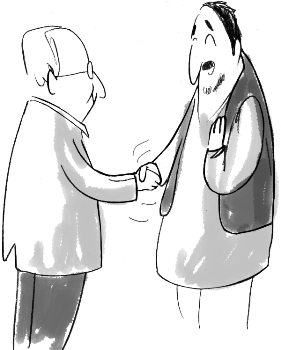
Chapter 3 – Community Life
-
People in Germany often shake hands with each other. They shake hands when they say hello and goodbye and when they meet new people. It is common for a person who joins a group to shake hands with each person who is already there. When you shake hands look at the other person in the eye. Both men and women all shake hands with each other.
-
Good friends often hug each other when they say hello or goodbye, and sometimes they also kiss each other on the cheek. They do this with people of the same and the opposite sex. This kind of hugging and kissing is just being friendly and is not meant in a sexual way.
-
People often say exactly what they think. They are not being rude, they are just being honest. Accepting and offering (constructive) criticism is considered to be an important way of improving your character, particularly in working life. So it is not uncommon to be criticized or criticize someone else.
-
Punctuality is very important. If you are going to be late for an appointment or a meeting by even only 5 minutes this will be seen as a lack of respect because you have kept the other person waiting. So, if you are late, call the person and tell them that you have been delayed. You should do this both in work situations and private occasions, such as when you are visiting friends.
-
When you are offered something, say “nein, danke” (no, thanks) to say no or “bitte” or “gerne” to say yes.
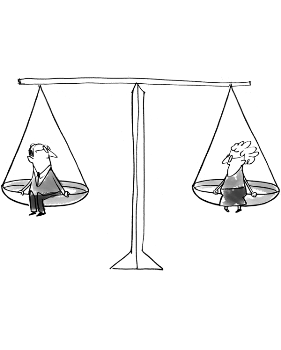
Chapter 4 – Equality
-
Discrimination because of gender, race, religion or sexual orientation is illegal. If someone discriminates you, or you feel threatened, even if only verbally: call the police. Never use violence in response to any type of comment, even if it is insulting, discriminating or threatening. Use of violence is illegal in Germany.
-
Men and women have equal rights and must be treated as equals. If a person tells you to leave them alone, you should leave them alone immediately. Harassing other people, both men and women, is strictly forbidden. Ask for permission before taking a picture of anyone.
-
Homosexuality is normal and legal in Germany. For example, one of the previous foreign ministers of Germany was openly gay. Homosexual couples can register themselves as a legal partnership.
-
People are free to choose who they want to marry and/or whether they want to get married at all. It is perfectly normal not to get married, to have unmarried parents or not to have or want any children.
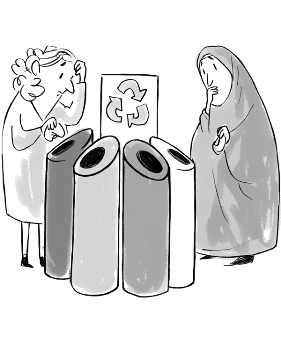
Chapter 5 – Environment and Ecology
-
People in Germany are known for their environmentally friendly behavior: they separate waste and try to recycle many things. Litter isn’t just dropped or left on the ground. This is true in towns and in the country, for example in parks, next to roads or in the woods. In public places people take their waste with them and throw it into the next waste bin, even if it means carrying their waste until they reach the waste bin. There are usually waste bins in public spaces, such as train stations, bus stops, parks, etc.
-
Lots of people in Germany try not to use too much energy or resources. They do this to protect the environment but also to save money. For example, people try to not leave the refrigerator open for too long (both at home and in supermarkets). People also usually switch off the lights when they leave a room.
-
Windows usually close very tightly, so sometimes you might need to open the windows to let some air in. To save energy, turn off the heating while the windows are open.
-
Many kinds of bottles have a deposit of between 8 Cents and 25 Cents on them. This deposit is refunded when you return the bottle. You can return bottles to any supermarket which sells them, not only the supermarket where you bought them. This is done to help the environment by recycling and re-using bottles and so producing less waste.
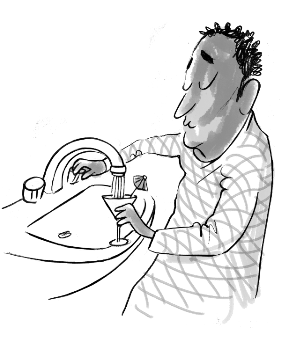
Chapter 6 – Food, Drinks, and Smoking
-
Drinking water from the tap is perfectly safe. Tap water is strictly controlled in Germany and so there is no risk. There are only a few exceptions, for example in public places or on trains, when a tap has a notice saying: “Kein Trinkwasser” (No drinking water).
-
In Germany there are a variety of meals which include pork, beef or chicken. You can always ask which meat is included in a meal if you do not want to eat a particular type of meat. Traditionally Germans eat a lot of pork.
-
You might find a lot of places which sell “Döner”, which is simply kebab meat in a bread roll. The meat is either chicken, veal or lamb. Döners, like other fast food (pizzas, burgers, fries, etc.) are usually eaten with your fingers, without cutlery (knives & forks). However, cutlery is usually used when eating at a table.
-
A lot of German sweets contain gelatine, which is made from pork. So if you want to make sure that a sweet is halal, buy the ones that have “vegetarian” on the label or check the list of ingredients for “Gelatine”.
-
Germany has a variety of cheap supermarkets known as “discounters” (for example, ALDI, LIDL, and Penny), as well as more expensive supermarkets (for example REWE and EDEKA). You’ll find everything you need for everyday life at a supermarket. There are also farmers’ markets, and smaller supermarkets, including Turkish, African, Asian or Greek supermarkets. If you only eat halal meat and sweets you will most likely find these at the Turkish or Arabic supermarkets (or restaurants). Unlike supermarkets, some petrol stations are open 24h a day and often sell groceries, too, but they are very expensive in comparison.
-
Drinking alcohol, mostly beer and wine, is common at social events in the evening, such as during dinner or meeting friends. However, it is perfectly OK not to drink alcohol and many Germans do not drink any alcohol at all either. If you are offered an alcoholic drink, you can always say “nein, danke” if you don’t want it. It is illegal to drive when you have been drinking alcohol.
-
Smoking is common in many public places, and both men and women smoke. In restaurants and at train stations there are special “smoking areas”. It is generally considered more polite to go outside or on the balcony when you smoke. Smoking next to nonsmokers, children or pregnant women is considered to be rude.

Chapter 7 – Formalities
-
Shops and (government) offices open and close at set times. If for example the opening hours or “Öffnungszeiten” end at 4 pm (16.00) it is advisable to be there by 3.55 pm (15.55) because by 4.01 pm (16.01) the place may be closed. Trains, buses, etc. also leave at set departure times.
-
Dealing with bureaucracy is sometimes quite complicated and can seem inefficient. Some things take a long time and things are done according to standardized procedures. This can be very frustrating. However, remember, procedures are the same for everybody and are designed to be fair. Offering or accepting bribes is a crime.
-
People in Germany obey the traffic regulations most of the time. They obey signs and stop at red traffic lights even if nobody is in sight. If there is no sign and/or no traffic lights the person coming from the right has the right of way (“Rechts vor Links”).
-
In some places, especially in cities, there are separate paths or lanes only for bicycles. Texting and talking on the phone while you are driving is forbidden. When travelling by car, all passengers must fasten their seatbelts. In a car, children must use a special seat suitable for their size.
-
Telephone calls are usually made during office hours, so until 4 or 5 o’clock in the afternoon. Private calls are usually not made after 9 or 10 in the evening. When making a call, identify yourself by saying your name first.
-
When using public transport, you must buy a ticket beforehand. You can buy tickets at service points or ticket machines. When you get on a tram, bus or city train, you sometimes have to validate your ticket for your ride. (This is the case in cities, like Berlin or Munich.) The procedures and types of ticket available vary from region to region and city to city.
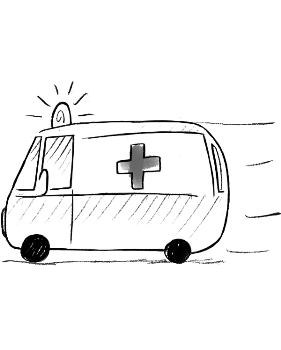
Chapter 8 – In Case of Emergency
-
Always try to help other people if they are in danger. Don’t just look away, there is always something you can do. By law everyone is required to help a person who is in danger, for example, by providing first aid and calling emergency services (see below).
-
In case of fights, theft, or sexual harassment: call the police (dial 110 on any phone). Police officers are usually friendly. They are there to help you and they will always take all calls seriously.
-
In case of a fire or medical emergency: call the fire brigade (dial 112 on any phone). This number should only be used for (life-threatening) emergencies. The same is true about going to the emergency room at a hospital.
-
If you are a refugee and need to see a doctor, you have to go to the social security office first. Doctors’ surgeries are usually open from 8 o’clock until 12 o’clock in the morning and sometimes in the afternoon, too. Most doctors speak English.
-
If you need to get medication in the evening, or on a Sunday or public holiday, you can go to a late-night or standby pharmacy (“Notapotheke”). To find out which pharmacy is on standby duty, use google or call 22 8 33 (max. 69 Cent/Min.). The name and address of the nearest standby pharmacy is also posted on the doors of all other pharmacies in the area.
Chapter 9 – About this Guide
This guide is intended for visitors to Germany, refugees and future citizens. Its aim is to provide orientation to visitors when they first arrive in Germany. This guide aims to provide useful information for refugees for the time before they can participate in integration courses and German classes offered by the government. As of September 2015, this kind of information had not yet been provided in a guide for this purpose by the BAMF (Bundesamt für Migration und Flüchtlinge).
The illustrated guide is available in different languages. It is available online with the option of printing it for distribution. A printed booklet may become available at a later date.
The sole purpose of this guide is to provide useful information. However, it is possible that this guide could also be perceived as being arrogant or pejorative. We have been aware of this throughout this project.
The concept and content of this guide has been designed and compiled with the support of many people (e.g. people from Syria, Afghanistan, Sudan, Egypt, Palestine; people who recently immigrated to Germany; people who are currently refugees, etc.). It was very important to involve refugees in designing this guide. When discussing this project with refugees, it was discussed whether a guide like this might be seen as being arrogant or pejorative. The refugees explicitly rejected this concern. To the contrary, they said this is exactly the kind of information they need.
